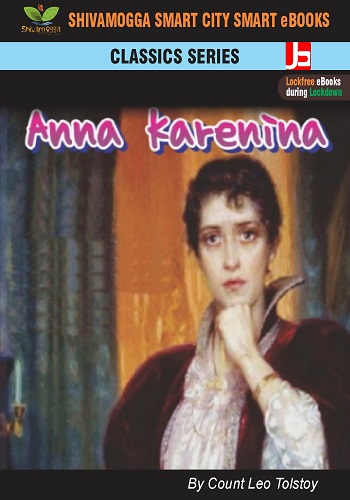-
 The mystery by E. Phillips Oppenheim starts out in the Sierra Nevada mountains, 500 miles from San Francisco, at a gold mining camp. Bryan came to America from England, chasing a man who may have papers which explain Bryan's mysterious origins. Enter heroine, the beautiful orphan Myra Mercier who is arriving to the camp where women are not allowed. Murder and mayhem ensue before the pair escapes to San Francisco. Bryan abandons Myra and travels back to England alone, where he takes up residence in the country, near the home of Lady Helen, the ward of Lord Wessemer. Bryan seeks to improve himself, and his status, in order to win the hand of the beautiful, but cold, Lady Helen. Finally, Myra makes her way to England as a actress, and Bryan decide who to wed.
The mystery by E. Phillips Oppenheim starts out in the Sierra Nevada mountains, 500 miles from San Francisco, at a gold mining camp. Bryan came to America from England, chasing a man who may have papers which explain Bryan's mysterious origins. Enter heroine, the beautiful orphan Myra Mercier who is arriving to the camp where women are not allowed. Murder and mayhem ensue before the pair escapes to San Francisco. Bryan abandons Myra and travels back to England alone, where he takes up residence in the country, near the home of Lady Helen, the ward of Lord Wessemer. Bryan seeks to improve himself, and his status, in order to win the hand of the beautiful, but cold, Lady Helen. Finally, Myra makes her way to England as a actress, and Bryan decide who to wed. -
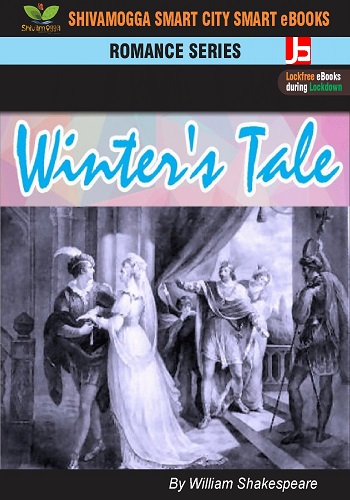 The Winter's Tale is a play by William Shakespeare originally published in the First Folio of 1623. Although it was grouped among the comedies, many modern editors have relabelled the play as one of Shakespeare's late romances. Some critics consider it to be one of Shakespeare's "problem plays" because the first three acts are filled with intense psychological drama, while the last two acts are comedic and supply a happy ending.
The Winter's Tale is a play by William Shakespeare originally published in the First Folio of 1623. Although it was grouped among the comedies, many modern editors have relabelled the play as one of Shakespeare's late romances. Some critics consider it to be one of Shakespeare's "problem plays" because the first three acts are filled with intense psychological drama, while the last two acts are comedic and supply a happy ending. -
 While the word “gentlemen” suggests that its heroes are adults, The Two Gentlemen of Verona is more intelligible if we think of them as boys, leaving home for the first time. One has a crush on a girl, Julia, though he hasn’t yet told her. Sent to court to learn to be “perfect gentlemen,” Valentine and Proteus are derailed by their attraction to Sylvia, the ruler’s daughter. Valentine’s mental denseness does not deter Sylvia from returning his love, but he is caught, and banished, when he tries to elope with her. Proteus’s desire for Sylvia wipes out his former love, leading him into despicable acts that win scorn from Sylvia and wound Julia, who has pursued him disguised as a boy. When Sylvia follows Valentine into banishment, Proteus follows Sylvia, and Julia follows Proteus, the stage is set for a disturbing ending. But the stage is also set for the “gentlemen” to take small steps toward maturity.
While the word “gentlemen” suggests that its heroes are adults, The Two Gentlemen of Verona is more intelligible if we think of them as boys, leaving home for the first time. One has a crush on a girl, Julia, though he hasn’t yet told her. Sent to court to learn to be “perfect gentlemen,” Valentine and Proteus are derailed by their attraction to Sylvia, the ruler’s daughter. Valentine’s mental denseness does not deter Sylvia from returning his love, but he is caught, and banished, when he tries to elope with her. Proteus’s desire for Sylvia wipes out his former love, leading him into despicable acts that win scorn from Sylvia and wound Julia, who has pursued him disguised as a boy. When Sylvia follows Valentine into banishment, Proteus follows Sylvia, and Julia follows Proteus, the stage is set for a disturbing ending. But the stage is also set for the “gentlemen” to take small steps toward maturity. -
 The Tempest has Romantics elements of both tragedy and comedy. The Tempest is one of two of Shakespeare’s works that is set on an island. The action takes place over the course of one day. Prospero, the rightful Duke of Milan, has been exiled to the island by his brother Antonio who had usurped his title twelve years before. Antonio was able to achieve this with the help of Alonso, the King of Naples. Prospero lives on the island with his fifteen year old daughter Miranda.
The Tempest has Romantics elements of both tragedy and comedy. The Tempest is one of two of Shakespeare’s works that is set on an island. The action takes place over the course of one day. Prospero, the rightful Duke of Milan, has been exiled to the island by his brother Antonio who had usurped his title twelve years before. Antonio was able to achieve this with the help of Alonso, the King of Naples. Prospero lives on the island with his fifteen year old daughter Miranda. -
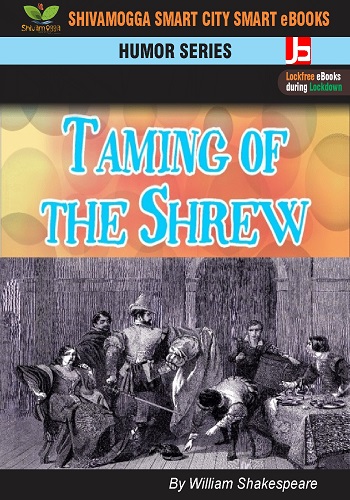 Love and wit conquer all in Shakespeare's sparkling comedy of self-delusion and disguise. Padua holds many suitors for the hand of fair Bianca, but Bianca may not be married until her spinster sister, Kate, is wed. Could any man be rash enough to take on Kate? The witty adventurer Petruchio undertakes the task. While he sets about transforming Kate from foul-tempered termagant to loving wife, young Lucentio and his clever servant
Love and wit conquer all in Shakespeare's sparkling comedy of self-delusion and disguise. Padua holds many suitors for the hand of fair Bianca, but Bianca may not be married until her spinster sister, Kate, is wed. Could any man be rash enough to take on Kate? The witty adventurer Petruchio undertakes the task. While he sets about transforming Kate from foul-tempered termagant to loving wife, young Lucentio and his clever servant -
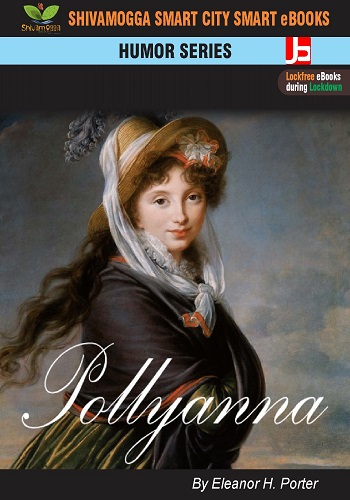 Pollyanna Whittier, is a young orphan who goes to live in Beldingsville, Vermont, with her wealthy but stern Aunt Polly. Pollyanna's philosophy of life centers on what she calls "The Glad Game", an optimistic attitude she learned from her father. The game consists of finding something to be glad about in every situation. It was one of the best theater plays with a four act comedy
Pollyanna Whittier, is a young orphan who goes to live in Beldingsville, Vermont, with her wealthy but stern Aunt Polly. Pollyanna's philosophy of life centers on what she calls "The Glad Game", an optimistic attitude she learned from her father. The game consists of finding something to be glad about in every situation. It was one of the best theater plays with a four act comedy -
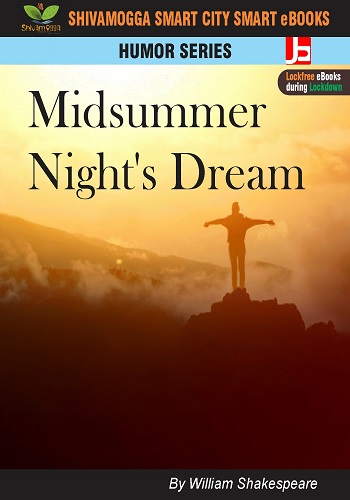 Two pairs of young lovers fall asleep in an ancient Athenian forest and wake to find themselves in the middle of a good deed gone wrong. A Midsummer Night's Dream conjures up a fairyland inhabited by well-intentioned sprites whose magic leads to farcical confusion. The mirthful tangle of mistaken identities and misplaced affections develops and resolves in the glorious poetry of England's greatest playwright.Shakespeare's fantastical comedy has enchanted audiences
Two pairs of young lovers fall asleep in an ancient Athenian forest and wake to find themselves in the middle of a good deed gone wrong. A Midsummer Night's Dream conjures up a fairyland inhabited by well-intentioned sprites whose magic leads to farcical confusion. The mirthful tangle of mistaken identities and misplaced affections develops and resolves in the glorious poetry of England's greatest playwright.Shakespeare's fantastical comedy has enchanted audiences -
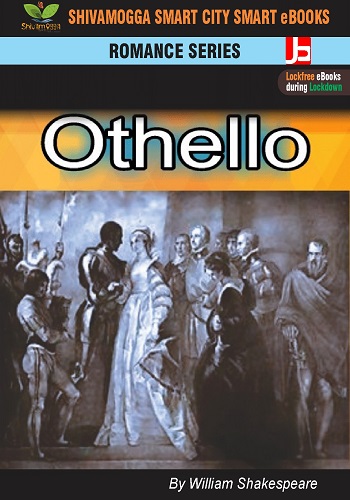 Othello (The Romance of Othello, the Moor of Venice) is a tragedy by William Shakespeare. It is based on the story Un Capitano Moro ("A Moorish Captain") by Cinthio (a disciple of Boccaccio's). The story revolves around its two central characters: Othello, a Moorish general in the Venetian army, and his treacherous ensign, Iago. Given its varied and enduring themes of racism, love, jealousy, betrayal, revenge, and repentance.
Othello (The Romance of Othello, the Moor of Venice) is a tragedy by William Shakespeare. It is based on the story Un Capitano Moro ("A Moorish Captain") by Cinthio (a disciple of Boccaccio's). The story revolves around its two central characters: Othello, a Moorish general in the Venetian army, and his treacherous ensign, Iago. Given its varied and enduring themes of racism, love, jealousy, betrayal, revenge, and repentance. -
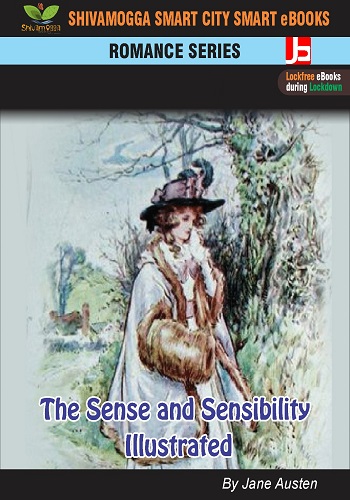 Jane Austen’s first published novel, Sense and Sensibility is a wonderfully entertaining tale of flirtation and folly that revolves around two starkly different sisters, Elinor and Marianne Dashwood. While Elinor is thoughtful, considerate, and calm, her younger sister is emotional and wildly romantic. Both are looking for a husband, but neither Elinor’s reason nor Marianne’s passion can lead them to perfect happiness—as Marianne falls for an unscrupulous rascal and Elinor becomes attached to a man who’s already engaged. Startling secrets, unexpected twists, and heartless betrayals interrupt the marriage games that follow. Filled with satiric wit and subtle characterizations, Sense and Sensibility teaches that true love requires a balance of reason and emotion.
Jane Austen’s first published novel, Sense and Sensibility is a wonderfully entertaining tale of flirtation and folly that revolves around two starkly different sisters, Elinor and Marianne Dashwood. While Elinor is thoughtful, considerate, and calm, her younger sister is emotional and wildly romantic. Both are looking for a husband, but neither Elinor’s reason nor Marianne’s passion can lead them to perfect happiness—as Marianne falls for an unscrupulous rascal and Elinor becomes attached to a man who’s already engaged. Startling secrets, unexpected twists, and heartless betrayals interrupt the marriage games that follow. Filled with satiric wit and subtle characterizations, Sense and Sensibility teaches that true love requires a balance of reason and emotion. -
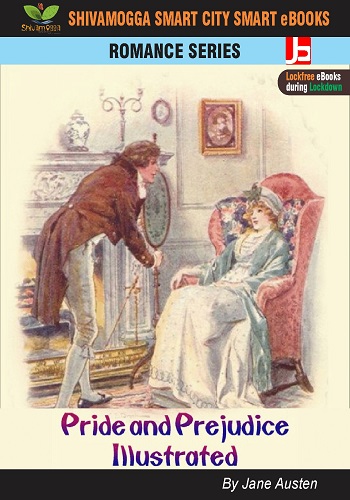 "It is a truth universally acknowledged, that a single man in possession of a good fortune, must be in want of a wife." And certainly what Melville did for whaling Austen does for marriage--tracing the intricacies (not to mention the economics) of 19th-century British rituals with a sure hand and an unblinking eye. As usual, Austen trains her sights on a country village and a few families--in this case, the Bennets, the Philips, and the Lucases. Into their midst comes Mr. Bingley, a single man of good fortune, and his friend, Mr. Darcy, who is even richer. Mrs. Bennet, who married above her station, sees their arrival as an opportunity to marry off at least one of her five daughters. Bingley is complaisant and easily charmed by the eldest Bennet girl, Jane; Darcy, however, is harder to please. Put off by Mrs. Bennet's vulgarity and the untoward behavior of the three younger daughters, he is unable to see the true worth of the older girls, Jane and Elizabeth. His excessive pride offends Lizzy, who is more than willing to believe the worst that other people have to say of him; when George Wickham, a soldier stationed in the village, does indeed have a discreditable tale to tell, his words fall on fertile ground. Having set up the central misunderstanding of the novel, Austen then brings in her cast of fascinating secondary characters: Mr. Collins, the sycophantic clergyman who aspires to Lizzy's hand but settles for her best friend, Charlotte, instead; Lady Catherine de Bourgh, Mr. Darcy's insufferably snobbish aunt; and the Gardiners, Jane and Elizabeth's low-born but noble-hearted aunt and uncle. Some of Austen's best comedy comes from mixing and matching these representatives of different classes and economic strata, demonstrating the hypocrisy at the heart of so many social interactions. And though the novel is rife with romantic misunderstandings, rejected proposals, disastrous elopements, and a requisite happy ending for those who deserve one, Austen never gets so carried away with the romance that she loses sight of the hard economic realities of 19th-century matrimonial maneuvering. Good marriages for penniless girls such as the Bennets are hard to come by, and even Lizzy, who comes to sincerely value Mr. Darcy, remarks when asked when she first began to love him: "It has been coming on so gradually, that I hardly know when it began. But I believe I must date it from my first seeing his beautiful grounds at Pemberley." She may be joking, but there's more than a little truth to her sentiment, as well. Jane Austen considered Elizabeth Bennet "as delightful a creature as ever appeared in print". Readers of Pride and Prejudice would be hard-pressed to disagree. --Alix Wilber
"It is a truth universally acknowledged, that a single man in possession of a good fortune, must be in want of a wife." And certainly what Melville did for whaling Austen does for marriage--tracing the intricacies (not to mention the economics) of 19th-century British rituals with a sure hand and an unblinking eye. As usual, Austen trains her sights on a country village and a few families--in this case, the Bennets, the Philips, and the Lucases. Into their midst comes Mr. Bingley, a single man of good fortune, and his friend, Mr. Darcy, who is even richer. Mrs. Bennet, who married above her station, sees their arrival as an opportunity to marry off at least one of her five daughters. Bingley is complaisant and easily charmed by the eldest Bennet girl, Jane; Darcy, however, is harder to please. Put off by Mrs. Bennet's vulgarity and the untoward behavior of the three younger daughters, he is unable to see the true worth of the older girls, Jane and Elizabeth. His excessive pride offends Lizzy, who is more than willing to believe the worst that other people have to say of him; when George Wickham, a soldier stationed in the village, does indeed have a discreditable tale to tell, his words fall on fertile ground. Having set up the central misunderstanding of the novel, Austen then brings in her cast of fascinating secondary characters: Mr. Collins, the sycophantic clergyman who aspires to Lizzy's hand but settles for her best friend, Charlotte, instead; Lady Catherine de Bourgh, Mr. Darcy's insufferably snobbish aunt; and the Gardiners, Jane and Elizabeth's low-born but noble-hearted aunt and uncle. Some of Austen's best comedy comes from mixing and matching these representatives of different classes and economic strata, demonstrating the hypocrisy at the heart of so many social interactions. And though the novel is rife with romantic misunderstandings, rejected proposals, disastrous elopements, and a requisite happy ending for those who deserve one, Austen never gets so carried away with the romance that she loses sight of the hard economic realities of 19th-century matrimonial maneuvering. Good marriages for penniless girls such as the Bennets are hard to come by, and even Lizzy, who comes to sincerely value Mr. Darcy, remarks when asked when she first began to love him: "It has been coming on so gradually, that I hardly know when it began. But I believe I must date it from my first seeing his beautiful grounds at Pemberley." She may be joking, but there's more than a little truth to her sentiment, as well. Jane Austen considered Elizabeth Bennet "as delightful a creature as ever appeared in print". Readers of Pride and Prejudice would be hard-pressed to disagree. --Alix Wilber -
 At Baskerville Hall on the grim moors of Devonshire, a legendary curse has apparently claimed one more victim. Sir Charles Baskerville has been found dead. There are no signs of violence, but his face is hideously distorted with terror. Years earlier, a hound-like beast with blazing eyes and dripping jaws was reported to have torn out the throat of Hugo Baskerville. Has the spectral destroyer struck again? More important, is Sir Henry Baskerville, younger heir to the estate, now in danger?Enter Sherlock Holmes, summoned to protect Sir Henry from the fate that has threatened the Baskerville family. As Holmes and Watson begin to investigate, a blood-chilling howl from the fog-shrouded edges of the great Grimpen Mire signals that the legendary hound of the Baskervilles is poised for yet another murderous attack. It has often been called the best detective story ever written. It remains a thrilling tale of suspense, must reading for every lover of detective fiction.
At Baskerville Hall on the grim moors of Devonshire, a legendary curse has apparently claimed one more victim. Sir Charles Baskerville has been found dead. There are no signs of violence, but his face is hideously distorted with terror. Years earlier, a hound-like beast with blazing eyes and dripping jaws was reported to have torn out the throat of Hugo Baskerville. Has the spectral destroyer struck again? More important, is Sir Henry Baskerville, younger heir to the estate, now in danger?Enter Sherlock Holmes, summoned to protect Sir Henry from the fate that has threatened the Baskerville family. As Holmes and Watson begin to investigate, a blood-chilling howl from the fog-shrouded edges of the great Grimpen Mire signals that the legendary hound of the Baskervilles is poised for yet another murderous attack. It has often been called the best detective story ever written. It remains a thrilling tale of suspense, must reading for every lover of detective fiction. -
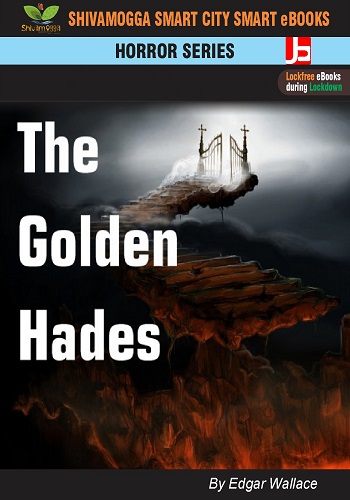 This early work by Edgar Wallace. ""The Golden Hades"" is a tale of murder and a symbol on bank notes leading to a sinister organization. This mystery novel features Wilbur Smith of the Treasury Department for Counterfeit in his investigations. Each time a crime happens be it a robbery or a murder, there is a sinister sign of Pluto (Hades) gold there... a statue of the Greek god of the underworld and the sign of dangerous gang of forgers. One of the most prolific writers of the twentieth century, Edgar Wallace was an immensely popular author, who created exciting thrillers spiced with tales of treacherous crooks and hard-boiled detectives. **
This early work by Edgar Wallace. ""The Golden Hades"" is a tale of murder and a symbol on bank notes leading to a sinister organization. This mystery novel features Wilbur Smith of the Treasury Department for Counterfeit in his investigations. Each time a crime happens be it a robbery or a murder, there is a sinister sign of Pluto (Hades) gold there... a statue of the Greek god of the underworld and the sign of dangerous gang of forgers. One of the most prolific writers of the twentieth century, Edgar Wallace was an immensely popular author, who created exciting thrillers spiced with tales of treacherous crooks and hard-boiled detectives. ** -
 Earnest and naive solicitor Jonathan Harker travels to Transylvania to organise the estate of the infamous Count Dracula at his crumbling castle in the ominous Carpathian Mountains. Through notes and diary entries, Harker keeps track of the horrors and terrors that beset him at the castle, telling his fiancé Mina of the Count’s supernatural powers and his own imprisonment. Although Harker eventually manages to escape and reunite with Mina, his experiences have led to a mental breakdown of sorts. Meanwhile in England, Mina’s friend Lucy has been bitten and begins to turn into a vampire. With the help of Professor Van Helsing, a previous suitor of Lucy’s, Seward, and Lucy’s fiancé Holmwood attempt to thwart Count Dracula and his attempts on Lucy and consequently Mina’s life. Arguably the most enduring Gothic novel of all times, Bram Stoker’s Dracula is as chilling today in its depiction of the vampire world and its exploration of Victorian values as it was at its time of publication.
Earnest and naive solicitor Jonathan Harker travels to Transylvania to organise the estate of the infamous Count Dracula at his crumbling castle in the ominous Carpathian Mountains. Through notes and diary entries, Harker keeps track of the horrors and terrors that beset him at the castle, telling his fiancé Mina of the Count’s supernatural powers and his own imprisonment. Although Harker eventually manages to escape and reunite with Mina, his experiences have led to a mental breakdown of sorts. Meanwhile in England, Mina’s friend Lucy has been bitten and begins to turn into a vampire. With the help of Professor Van Helsing, a previous suitor of Lucy’s, Seward, and Lucy’s fiancé Holmwood attempt to thwart Count Dracula and his attempts on Lucy and consequently Mina’s life. Arguably the most enduring Gothic novel of all times, Bram Stoker’s Dracula is as chilling today in its depiction of the vampire world and its exploration of Victorian values as it was at its time of publication.




